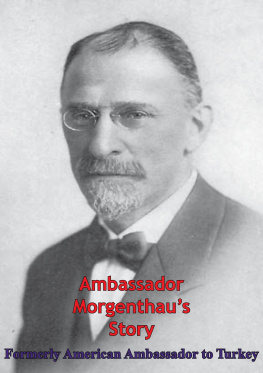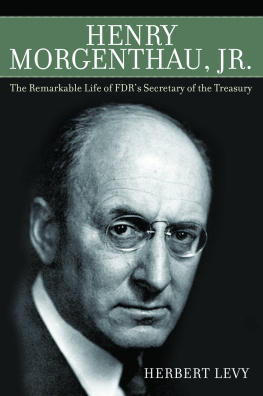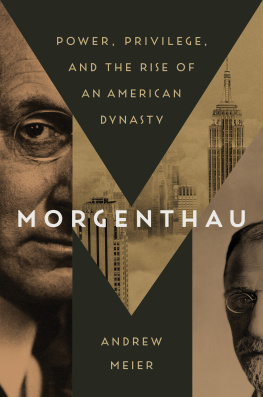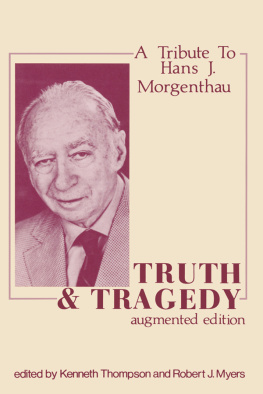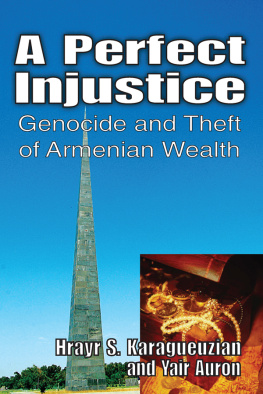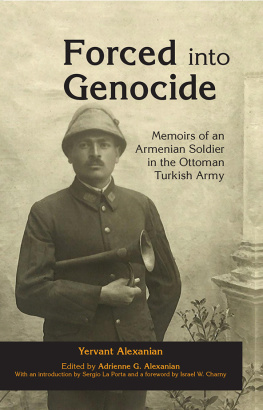Chapter I
A German Superman at Constantinople
I AM writing these reminiscences of my ambassadorship at a moment when Germanys schemes in the Turkish Empire and the Near East have achieved an apparent success. The Central Powers have disintegrated Russia, have transformed the Baltic and the Black Seas into German lakes, and have obtained a new route to the East by way of the Caucasus. Germany now dominates Serbia, Bulgaria, Rumania, and Turkey, and regards her aspirations for a new Teutonic Empire, extending from the North Sea to the Persian Gulf, as practically realised. The world now knows, though it did not clearly understand this fact in 1914, that Germany precipitated the war to destroy Serbia, seize control of the Balkan nations, transform Turkey into a vassal state, and thus obtain a huge oriental empire that would form the basis for unlimited world dominion. Do these German aggressions in the East mean that this extensive programme has succeeded?
As I look upon the new map, which shows Germanys recent military and diplomatic triumphs, my experiences in Constantinople take on a new meaning. I now see the events of these twenty-six months as part of a connected, definite story. The several individuals that moved upon the scene now appear as players in a carefully staged, superbly managed drama. I see clearly enough now that Germany had made all her plans for world dominion and that the country to which I had been accredited as American Ambassador was the foundation of the Kaisers whole political and military structure. Had Germany not acquired control of Constantinople in the early days of the war, it is not unlikely that hostilities would have ended a few months after the battle of the Marne. It was certainly an amazing fate that landed me in this great headquarters of intrigue at the very moment when the plans of the Kaiser, carefully pursued for a quarter of a century, were about to achieve their final success.
For the work of subjugating Turkey and transforming its army and its territory into instruments of Germany, the Emperor had sent to Constantinople an Ambassador who was ideally fitted for the task. The mere fact that Wilhelm had personally selected Baron von Wangenheim for this post shows that he had accurately gauged the human qualities needed for this great diplomatic enterprise.
The Kaiser had early selected Wangenheim as a useful instrument for his plans; he had more than once summoned him to Corfu for his vacations, and here, we may be sure, the two congenial spirits had passed many days discussing German ambitions in the East. At the time I first met him, Wangenheim was fifty-four years old; he had given a quarter of a century to the diplomatic service, he had seen service in such different places as Petrograd, Copenhagen, Madrid, Athens, and Mexico, and he had been charg at Constantinople, several years later coming there as Ambassador. He understood completely all countries, including the United States; his first wife, indeed, had been an American, and Wangenheim, when Minister to Mexico, had intimately studied our country and acquired that admiration for our energy and progress which he frequently expressed. He had a complete technical equipment for a diplomat; he spoke German, English, and French with equal facility, he knew the East thoroughly, and had the widest acquaintance with public men. Physically he was one of the most striking persons I have ever known. When I was a boy in Germany, the Fatherland was usually symbolised as a beautiful and powerful womana kind of dazzling Valkyrie; when I think of modern Germany, however, the massive, burly figure of Wangenheim naturally presents itself to my mind. He was six feet, two inches tall; his huge, solid frame, his Gibraltar-like shoulders, erect and impregnable, his bold, defiant head, his piercing eyes, the whole physical structure constantly pulsating with life and activitythere stands, I would say, not the Germany which I had known, but the Germany whose limitless ambitions had transformed the world into a place of horror. And Wangenheims every act and every word typified this new and dreadful portent among the nations. Pan-Germany filled all his waking hours and directed his every action. The deification of his Emperor was the only religious instinct which impelled him. That aristocratic and autocratic organisation of German society which represents the Prussian system was, in Wangenheims eyes, something to be venerated and worshipped; with this as the ground work, Germany was inevitably destined, he believed, to rule the world. The great land-owning junker represented the perfection of mankind; I would despise myself, his closest associate once told me, and this represented Wangenheims attitude as well, if I had been born in a city. Wangenheim divided mankind into two classes, the governing and the governed; and he ridiculed the idea that the upper could ever be recruited from the lower. I recall with what unction and enthusiasm he used to describe the Emperors caste organisation of German estates; how he had made them non-transferable, and had even arranged it so that the possessors, or the prospective possessors, could not marry without the imperial consent. In this way, Wangenheim would say, we keep our governing classes pure, unmixed of blood. Like all of his social order, Wangenheim worshipped the Prussian military system; his splendid bearing showed that he had himself served in the army, and, in true German fashion, he regarded practically every situation in life from a military standpoint. I had one curious illustration of this when I asked Wangenheim one day why the Kaiser did not visit the United States. He would like to immensely, he replied, but it would be too dangerous. War might break out when he was coming home and the enemy would capture him. I suggested that that could hardly happen, as the American Government would escort its guest home with warships, and that no nation would care to run the risk of involving the United States as Germanys ally; but he still thought that the military danger would make any such visit impossible.
Upon him, upon more than almost any diplomatic representative of Germany, depended the success of the Kaisers conspiracy for world domination. This German diplomat came to Constantinople with a single purpose. For twenty years the German Government had been cultivating the Turkish Empire. All this time the Kaiser had been preparing for a world war, and in this war it was destined that Turkey should play an almost decisive part. Unless Germany should obtain the Ottoman Empire as its ally, there was little chance that she could succeed in a general European war. When France had made her alliance with Russia, this placed the man-power, 170,000,000, on her side, in the event of a war with Germany. For more than twenty years Germany had striven diplomatically to detach Russia from this French alliance, but had failed. There was only one way in which Germany could make valueless the Franco-Russian alliance; this was by obtaining Turkey as an ally. With Turkey on her side, Germany could close the Dardanelles, the only practical line of communication between Russia and her Western allies. This simple act would deprive the Czars army of war munitions, destroy Russia economically by stopping her grain exports, her greatest source of wealth, and thus detach Russia from her partners in the world war. Thus Wangenheims mission was to make it absolutely certain that Turkey should join Germany in the great contest that was impending.




